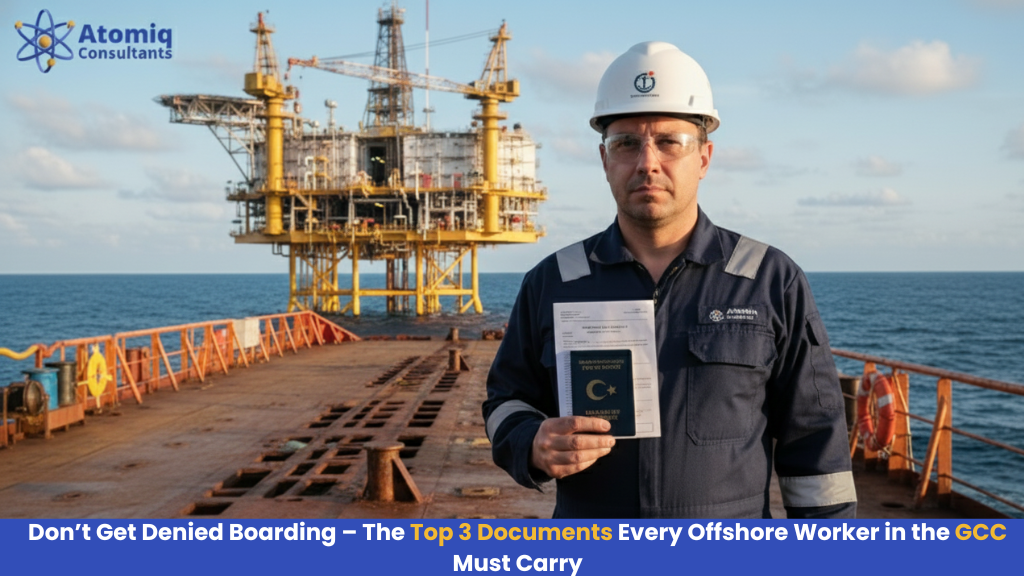The Top 3 Documents Every Offshore Worker in the GCC Must Carry

Introduction
Imagine being an offshore worker arriving at the heliport for your Gulf rig assignment, only to be denied boarding because a key document was missing or expired. Unfortunately, this scenario happens far too often to offshore workers headed to Saudi Arabia, Qatar, the UAE, or Oman.
In offshore employment, documentation is as critical as your skills. These papers prove you’re trained, certified, and medically cleared to work in one of the world’s most safety-regulated environments.
To help you stay compliant and avoid last-minute stress, Seaman Books highlights the top three must-carry documents every offshore professional should have before traveling to a rig in the GCC.
1. Continuous Discharge Certificate (CDC)—Your Maritime Identity
The CDC, or Seaman’s Book, is your official maritime identity issued by a government authority. It serves as a record of your sea service, vessel employment, and credentials.
Without a valid CDC, you cannot legally work on offshore vessels or rigs that fall under international maritime law.
Why It’s Important:
- Acts as proof of your seafarer status
- Records your experience and voyages
- Required for visa, immigration, and contract validation
Key Tips:
- Always carry the original CDC (not just a photocopy)
- Keep track of expiry and reissue timelines
- Some Gulf employers prefer or require a UAE CDC, especially for local offshore support vessels
Pro Tip: Seaman Books and Atomiq assist with CDC renewal and verification support to ensure your record is always up to date.
2. STCW Certification – Proof of International Maritime Competence
The STCW (Standards of Training, Certification, and Watchkeeping) certification mandates by the International Maritime Organization (IMO).
It confirms that you meet international competency standards for safety, survival, firefighting, and first aid—essential for anyone serving onboard a vessel or offshore installation.
Key STCW Modules:
- Personal Survival Techniques
- Fire Prevention & Firefighting
- Elementary First Aid
- Personal Safety & Social Responsibilities
Why It’s Important:
- Mandatory for all seafarers and offshore crew
- Recognized globally and required by all GCC operators
- Demonstrates that you are trained to handle emergencies at sea
Renewal Reminder: STCW certificates typically need refreshing every five years.
Did You Know? Seaman Books helps workers locate STCW training centers in Dubai and India that are approved under IMO and DG Shipping standards.
3. BOSIET (Basic Offshore worker Safety Induction & Emergency Training)—Your Ticket Offshore
The BOSIET certification is the gold standard for offshore safety training.
Whether you’re working on oil rigs in Saudi Arabia, platforms in Qatar, or offshore vessels in Dubai, BOSIET (and HUET, its helicopter escape module) is your pass to board.
What It Covers:
- Helicopter underwater escape training (HUET)
- Sea survival techniques
- Firefighting and emergency breathing systems
- First aid and rescue drills
Why It’s Important:
- Required by all offshore oil & gas companies in the GCC
- Ensures you can handle emergencies confidently
- Non-holders are not permitted to fly offshore
Validity: 4 years, after which a FOET (refresher) is needed.
Tip: Always verify your BOSIET certificate’s OPITO number—Gulf operators cross-check it before deployment.
The Risk of Missing or Expired Documents
Failing to carry valid documentation can result in:
- Denied boarding at the heliport or vessel checkpoint
- Job cancellation or blacklisting from contractors
- Delays in deployment and loss of income
- Insurance and legal issues in case of incidents
Maintaining valid certifications isn’t just a rule—it’s your professional responsibility.
How Atomiq Group Helps Offshore Worker Stay Compliant
Navigating document renewals, expiry dates, and international standards can be overwhelming. That’s where Atomiq Group come in.
Our support services include:
- Document Verification & Tracking—We help verify STCW, BOSIET, and CDC authenticity before deployment.
- Expiry Reminders—Get notified when your documents are about to expire.
- Certification Packages—Combine STCW, BOSIET, and CDC support for Gulf deployment readiness.
- Country-Specific Guidance—Know the exact requirements for Saudi, Qatar, and UAE rigs.
We simplify compliance so you can focus on your offshore career, not on paperwork.
Final Thoughts
Working offshore in the Gulf region offers exciting opportunities—but preparation is key.
Before you head to the rig, double-check that your CDC, STCW, and BOSIET documents are valid, verified, and easily accessible.
Your documents are more than just formalities — they’re your passport to safety and success offshore.
Don’t risk being turned away at the heliport.
Contact Seaman Books today for help with offshore documentation, certification tracking, and Gulf compliance guidance.
Frequently Asked Questions
- What are the absolute must-have documents for working offshore in the GCC?
You need a valid Seaman’s Book (CDC), an up-to-date STCW training certificate, and a compliant passport (with required visas); missing any one of these could block your job entry. - How often do I have to renew these key offshore documents?
Generally every five years for CDC and STCW, and as per national rules for passport/visas—some clients and rigs ask for even stricter renewal intervals. - Can I work on offshore platforms in the GCC with expired documents?
No—expired documents lead to denied boarding, delayed contracts, and possible fines from authorities. - What happens if I lose my CDC or STCW certificate while offshore?
Notify your employer and agent immediately; emergency replacement and courier solutions are available for urgent cases. - Do Atomiq Group or agents offer bundle support for all offshore document updates?
Yes—using an agent greatly simplifies yearly/5-year renewals, digital records, and urgent issue resolution.
